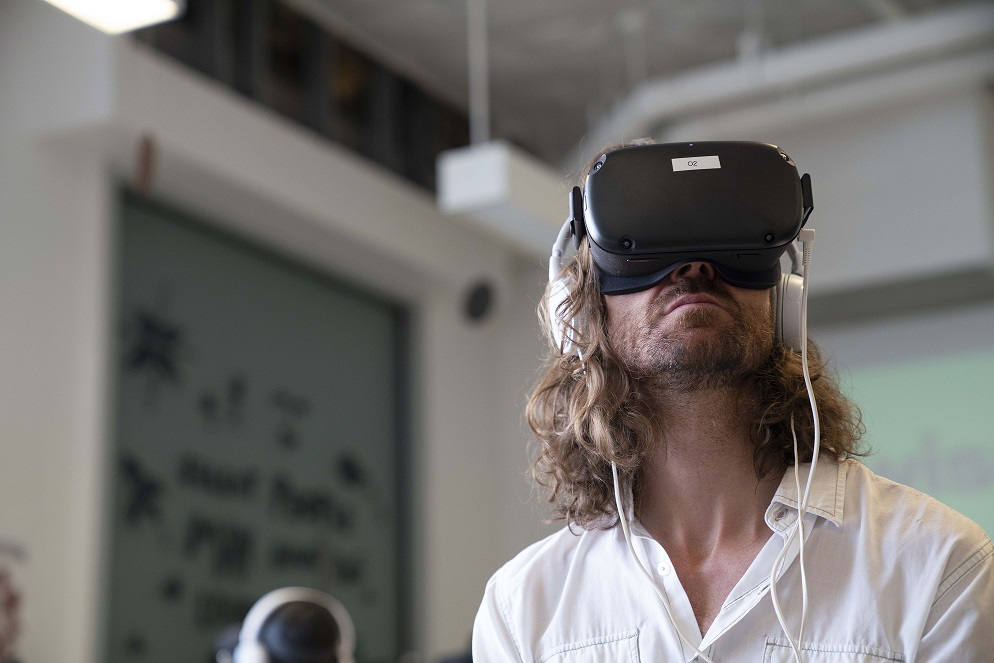
A Hunter region school is undertaking a world-first trial for students that involves a first-of-its kind Virtual Reality (VR) social and emotional learning (SEL) course replacing existing lessons during school hours.
Maitland Grossmann High School’s pivot to VR technology is supported by a growing body of research that shows significant benefits for students’ workplace training, distance learning opportunities, engagement, social skills and wellbeing.
A recent study by Edith Cowan University found that real-time VR could also potentially transform interview-based communication and change how counselling, recruitment, criminal investigations and even dating works in the future.
The trial of the Curiious IQ platform and the world-leading SEL course ‘WISE’ will initially focus on students in years 8-10 and be incorporated as standalone lessons in place of existing lessons on separate subject matter areas – a first for an Australian school.
Developed by Australian immersive learning company Curiious, the WISE program is a VR-based lesson which aims to provide students with the emotional tools needed to cope with anxiety and stress.
As part of the IQ platform, teachers can annotate and educate live within the virtual space, for an entire classroom at a time, a capability inherent uniquely to Curiious’ IQ platform and thus unable to be replicated by any other VR platforms.
James McDiarmid, Business Development and Education Consultant at Curiious, said the trial is being watched by schools abroad, with 20 or so school districts in the US interested in it.
“A key market for Curiious has always been North America and with an opportunity to take part in AusTrade's launching pad program last year, Curiious made its presence known in both California and New York,” McDiarmid told The Educator.
“For us the focus was to acquire a select few early adopters, and currently we have schools in New York, LA and San Diego using our Curiious PRO platform, all with watchful eyes on how our research project with Maitland Grossmann turns out with regards to teaching the WISE curriculum”.
‘The lessons learned will outlast the pandemic’
Mark Bayada, Head of Industrial Arts at Maitland Grossmann High School, said the catalyst for launching the trial was the need to equip students with the tools and the knowledge required to make it in life after high school.
“Maitland Grossmann is always looking at ways to teach our kids not just the traditional tools such as mathematics and science but other practical tools such as social-emotional competence,” Bayada told The Educator.
“A notable aspect of this VR program is it allows teachers to remain actively involved in the lesson, despite the immersion of the student into a VR environment. The students are excited by the technology”.
Bayada said VR is particularly important as it enables students to be fully immersed.
“The wellbeing of our students is crucial, and social and emotional learning is proven to be able to provide the tools to better cope with adversity,” he said.
“That’s a particularly relevant skill to learn in the current climate but it’s just as important for any subsequent challenging situations many students may face once they leave school”.
Bayada said the school is trialling the program “in spite of the pandemic, not because of it”.
“The lessons learned here will outlast the pandemic and our students will be able to take them into adulthood”.
‘Making the invisible visible’
Bayada said the program has allowed students to learn how to deal with negative thoughts, moments of anxiety and periods of stress.
“It uses methods developed by clinical psychologists to help patients cope, but the true benefit of bringing those lessons into a VR program is that the environment can be developed to make the invisible visible,” he explained.
“For example, one of the lessons in WISE deals with negative thoughts and students, led by a virtual guide, are able to work their way through a negative thought by labelling it”.
He said there has also been significant value add for professional development of teachers at the school as a result of launching the trial.
“This is an active part of their professional development and WISE is helping them understand the importance of teaching SEL, but in a completely new and exciting way,” he said.
“This is not only good for our students, but our teachers who are involved from the ground up in teaching the curriculum. We have used VR in the past but not with this level of interactivity between the students and their teachers”.


